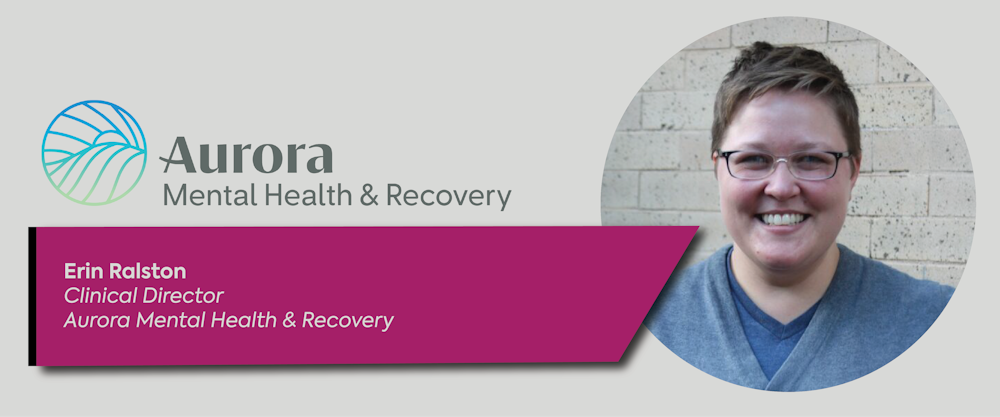
At Aurora Mental Health, Recovery Begins with Belonging
How one agency is walking beside moms — without judgment and without conditions.
This May, in honor of Maternal Mental Health Month, Tough as a Mother is spotlighting programs that model what it means to treat the whole mom. At Aurora Mental Health & Recovery (AMHR), that philosophy isn’t a tagline — it’s a daily practice. Spanning 12 locations and serving three counties across metro Denver, AMHR has built a continuum of care that recognizes the deep and lasting impact that motherhood, trauma and substance use can have — and the incredible transformation that’s possible when mothers feel seen.
“We know moms are often navigating their pregnancy or parenting journey alone,” says Erin Ralston, Clinical Director at AMHR. “Our role is to build connection — to remind her she doesn’t have to do this by herself.”
At the heart of that work is AMHR’s Early Childhood and Family Center, a specialized home- and clinic-based program designed for moms in the perinatal and postpartum periods. The team offers in-home support, helps moms navigate mental health and medical systems and breaks down barriers that often derail care — from transportation to lack of childcare to language access.
“Many of our moms are isolated, working multiple jobs or undocumented,” Ralston shared. “Sometimes they’ve had past experiences that make them fear reaching out at all, especially when substance use is involved. But we believe every mom deserves a safe place to land.”
That belief extends to their outpatient substance use treatment program, Reset Recovery Services, which works in close partnership with the Early Childhood and Family team. Together, the programs create a compassionate ecosystem for mothers experiencing substance use. Support is judgment-free and fully integrated: AMHR provides access to OB-GYN referrals, medication-assisted treatment (MAT), therapy and parenting groups — all tailored to each mother’s unique journey.
One of the most powerful practices? Radical transparency. “We’re mandated reporters. That doesn’t change,” Ralston acknowledged. “But what can change is how we show up. If we have to make a report, we do it with the mom — she’s in the room, she knows what’s being said and we stay by her side through the whole process. This isn’t something done to her behind closed doors.”
That kind of transparency helps rebuild trust, especially in systems where many moms feel punished, not supported. Through direct collaboration with local child protective services and full-time DHS liaisons, AMHR ensures that families don’t get lost in red tape. “These systems weren’t built for the moms we serve,” said Ralston. “We’re here to walk beside them while they find their footing and to remind them of their strength.”
That strength, she noted, often goes unnoticed. “The moms we work with have survived trauma, poverty, violence and immense stigma. Many of them use substances as a way to stay awake at night to protect themselves or their children. It’s not a failure. It’s a survival strategy.”
Instead of judgment, AMHR offers harm reduction and a deep commitment to meeting moms where they are. If a mom isn’t ready to stop using entirely, she’s supported with safer use strategies and a plan for gradual reduction. If she just needs a place to be — a safe place to sit, drink coffee and regroup — the building is open from 8 a.m. to 6 p.m. every weekday. “Sometimes the first win is just leaving the house,” Ralston said. “And we celebrate that.”
Importantly, AMHR embeds peer support into its model, not as an add-on, but as a foundational practice. Peers with lived experience aren’t just service providers — they help shape programs, review materials and sit in leadership roles. “If someone can say, ‘I’ve been where you are,’ that changes everything,” said Ralston. “It creates trust where there’s often fear.”
That commitment extends beyond clinical teams. “I oversee more than 55 people on staff,” Ralston added. “And I intentionally hire for lived experience in all roles, not just peer support. Whether someone has navigated mental health, substance use or supported a loved one through recovery, that experience is valuable. It brings wisdom, empathy and insight that training alone can’t provide.”
Peers also contribute to AMHR’s Client Advisory Council and program design. “When we’re building services or even revising a basic intake form, we turn to peers,” she said. “Their voice makes our work better, period.”
What Aurora Mental Health Wants Other Providers to Know
When asked what message she’d share with fellow providers across the state, Ralston’s answer was clear: start with the mom and stay beside her.
“Lead from within,” she said. “Treatment shouldn’t be prescriptive. It should be built with the mom, not for her. We have to stop expecting one-size-fits-all outcomes. Sometimes the biggest success is just showing up to a session. Or using one day less. Or asking for help for the first time. Celebrate those wins. Build from those strengths. And never assume the goal looks the same for every mom.”
Ralston also encourages providers to be honest about system barriers. “We can’t fix everything. But we can say, ‘This is hard and we’re going to figure it out together.’ That builds trust. That builds hope.”
And finally, a clear call to action: hire people with lived experience.
“Peers don’t just provide care, they change care,” Ralston said. “They make us more human, more responsive, more real. If we want to serve moms better, we need people on our teams who know what it feels like to walk in their shoes.”
And perhaps most importantly, she added, “Don’t ask a mom to choose between her treatment and her child. Create support that fits into her life because if we don’t, she’ll walk away. And we’ll miss the chance to help her heal.”
Share this article:





